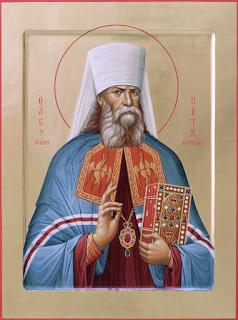“A wild animal is kinder than the wild-souled
atheists”.
Metropolitan Peter of Krutitsa (in the world, Peter Feodorovich Polyansky) was born in 1863. In 1920 he was Consecrated Bishop. In the will of
the most saintly Patriarch Tikhon, he was designated as one of the three
Hierarchs who were in turn to become Locum Tenens of the Patriarchal Throne
after his repose. On 12 April 1925, Metropolitan Peter assumed the governance
of the Russian Church, which was being put through terrible hardships by the
atheists.
From the
very first, Metropolitan Peter made no concessions to the Soviet State. After
several months, on 10
December of the same year, he was imprisoned and was successively sent to
prisons in Vyatka, Perm, Ekaterinburg, Tiumen, and Tobolsk (in Siberia).
 From
there, they exiled him to the village of Khe, near the Ob River, two hundred
kilometers from Obdorsk.
From
there, they exiled him to the village of Khe, near the Ob River, two hundred
kilometers from Obdorsk.
According
to Metropolitan Peter’s own account, which we know from many sources, one night
he was inhumanly thrown off the train Metropolitan Peter and Patriarch Tikhon
conveying him to Tobolsk. It is known that many Bishops and Priests died in
this manner. The Metropolitan fell on the snow as if onto a pillow. He got up
and looked around: snow, forest, not a sign of life.... He walked a long while
through the snow and finally grew tired. The bitter cold pierced his bones. He
was wearing only an old exorason [outer cassock—Trans.]. Understanding that his
end was approaching, he began to pray more intensely before he should die....
 Suddenly,
he saw an enormous bear approaching him! What was it doing there, seeing as how
those animals sleep all winter long, and when for some reason they do wake up,
they become terribly wild, aggressive and dangerous to people? Aghast at the
thought that he would be devoured, the Metropolitan did not have the strength
in his weariness and exhaustion to flee.
Suddenly,
he saw an enormous bear approaching him! What was it doing there, seeing as how
those animals sleep all winter long, and when for some reason they do wake up,
they become terribly wild, aggressive and dangerous to people? Aghast at the
thought that he would be devoured, the Metropolitan did not have the strength
in his weariness and exhaustion to flee.
The bear
approached, sniffed him, and peacefully lay down at his feet, coiled up with
his belly towards the Metropolitan, and, having stretched out, began to snore!
From his massive body emanated heat and life!
The
Metropolitan hesitated a bit, but then lay down on the bear’s fur, changing
sides a number of times towards her. At daybreak, he heard a distant cock-crow,
something which signified an inhabited area! Then, with great care not to wake
the bear, he got up. But the bear, as if it had not slept at all, got up, shook
himself, and calmly headed towards the forest!
In a
short while, the Metropolitan reached a small village in which he sought
hospitality, saying that his sister, who lived not far from there, would pay
the expenses. He was received in a house where he lived for half a year. He
wrote to his sister and she came to the village. But, shortly after, some other
“politicians” arrived—that is, agents of the secret police, the fearsome
“Cheka” (precursor of the KGB).
Twelve
years of inconceivable tortures followed: imprisonments, punishments, and
exiles to the frozen, Northern Arctic regions. Dozens of times, the Soviets
offered him the “opportunity” to abandon his Confession and to work together
with them, with the office of Locum Tenens, or even the Patriarchal Throne as
bait; but Metropolitan Peter remained faithful to our Holy Church.
He was
executed on 10 October
1937 in Magnitogorsk for the Faith
and love of Christ, without, of course, having seen earthly freedom, but having
been vouchsafed that holy Freedom that is granted by the Divine Comforter to
the children of God, in Christ and in His Church. Amen!
Source: http://www.hsir.org/Theology_en/E3d5023NMPetr.pdf

















CONVERSATION